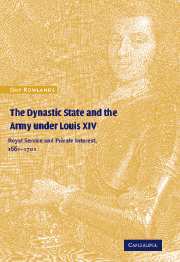Book contents
- Frontmatter
- Contents
- List of maps
- Acknowledgements
- List of abbreviations
- Family tree of the Le Tellier: 1. Principal branch
- Family tree of the Le Tellier: 2. Royal household marital connections
- Map 1 The French provinces under Louis XIV
- General introduction: ‘Absolute monarchy’, dynasticism and the standing army
- Part I ‘Patrimonial bureaucracy’: The Le Tellier dynasty and the Ministry of War
- Introduction
- 1 The Secretary of State for War and the dynastic interests of the Le Tellier family
- 2 The ebb and flow of Le Tellier power, 1661–1701
- 3 The use and abuse of servants: the Ministry of War, venality and civilian power in the army
- 4 Financing war: the treasury of the Extraordinaire des Guerres
- 5 Corruption and the pursuit of self-interest in the Ministry of War
- Part II The forging of the French officer corps and the standing army under Louis XIV
- Part III The high command of the French armies
- Conclusion: The preservation of the dynasty
- Appendix 1 Defining the grands
- Appendix 2 The proportion of revenue generated by the Extraordinaire des Guerres as a ‘primary receiver’
- Bibliography
- Index
- CAMBRIDGE STUDIES IN EARLY MODERN HISTORY
4 - Financing war: the treasury of the Extraordinaire des Guerres
Published online by Cambridge University Press: 20 May 2010
- Frontmatter
- Contents
- List of maps
- Acknowledgements
- List of abbreviations
- Family tree of the Le Tellier: 1. Principal branch
- Family tree of the Le Tellier: 2. Royal household marital connections
- Map 1 The French provinces under Louis XIV
- General introduction: ‘Absolute monarchy’, dynasticism and the standing army
- Part I ‘Patrimonial bureaucracy’: The Le Tellier dynasty and the Ministry of War
- Introduction
- 1 The Secretary of State for War and the dynastic interests of the Le Tellier family
- 2 The ebb and flow of Le Tellier power, 1661–1701
- 3 The use and abuse of servants: the Ministry of War, venality and civilian power in the army
- 4 Financing war: the treasury of the Extraordinaire des Guerres
- 5 Corruption and the pursuit of self-interest in the Ministry of War
- Part II The forging of the French officer corps and the standing army under Louis XIV
- Part III The high command of the French armies
- Conclusion: The preservation of the dynasty
- Appendix 1 Defining the grands
- Appendix 2 The proportion of revenue generated by the Extraordinaire des Guerres as a ‘primary receiver’
- Bibliography
- Index
- CAMBRIDGE STUDIES IN EARLY MODERN HISTORY
Summary
the fisco-financier system
Financing the French state during the ancien régime was an exceptionally complicated business, so much so that most historians have shied away from the subject. The crown was wholly dependent upon the business and financial activities of hundreds of officials and private individuals, whose interests were overlapping, interlocking and often mutually conflicting, in what historians have recently come to see as a ‘fisco-financier’ cosmos. Thanks to the work in recent decades of Julian Dent, Richard Bonney, James Collins, Françoise Bayard and Daniel Dessert, building on the earlier researches of tax historians over the last century, we now have a reasonably clear, if still uncomfortably intricate and incomplete, picture of the fiscal system of the Grand Siècle. However, the focus of all this work has been on the raising and mobilising of resources, and much less on the deployment and spending of money. In particular, the way money was channelled to the units making up the French army, and to the suppliers who provided for it, remains almost wholly unexplored. To be sure, there are tantalising clues scattered thinly throughout the pages of a number of books, but nobody has yet launched an investigation of military finance in the way that Jean Legoherel has delved into the navy. It would not be an exaggeration to say that there has been almost a complete divorce between scholarship on finance and scholarship on war for the reign of Louis XIV.
- Type
- Chapter
- Information
- The Dynastic State and the Army under Louis XIVRoyal Service and Private Interest 1661–1701, pp. 109 - 134Publisher: Cambridge University PressPrint publication year: 2002



